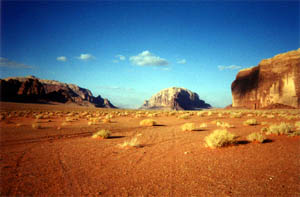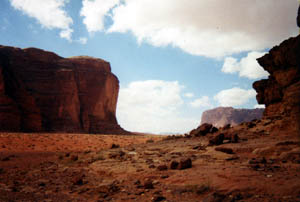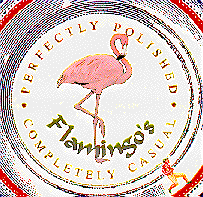
"We who have gone out to discover the meaning of the desert," wrote Lawrence of Arabia, "have found only emptiness; nothing but sand, wind, soil and empty space. The Bedouins leave behind them every extraneous comfort and go and live in the desert, in the very arms of starvation, that they may be free."
The Middle East in popular Western culture is very much a picture postcard land of spacious, endless deserts where one might expect to find herds of camels gathered round oases, tended by w ise looking Arabs in long robes. In fact, it wasn't until after 17 months in Palestine that I finally found myself in a real desert.
Wadi Rum is an enormous desert valley, two miles wide, located about 30km east of the Jordanian Red Sea port of Aqaba. Huge rock faces rise from the endless sand. One of the stomping grounds of T.E. Lawrence during the Arab Revolt in 1917-18, the area boasts a scattering of sites of historical interest -- Lawrence's Well, a first century Nabataean temple, and various examples of Thamudic and Kufic graffiti and rock art.

Yet, the attraction of Wadi Rum is the desert. The sense of space is immense and the clear desert air telescopes the distances involved, making what looked like a 15 minute walk into a trek of an hour or more. The canopy of stars that hung over us at night were shocking to those of us who live in smog-filled towns and cities. Silence naturally replaces conversation, even amongst groups of hikers, a reflection of the presence of the place.
Bedouin still live in tents dotted around the valley, most having made the transition from camels to four-wheel drive, reserving the former for the tourists. At times the wadi is filled with dozens ofjeeps, ferrying foreign and Jordanian "townies" on daytrips around the various sites. Even so, these signs of the encroachment of capitalism into this natural temple are swallowed up by the vastness of the millennium-old stones.
My return to the small-town Palestinian busyness of Ramallah was another reminder of a different kind of desert. The combination of the 1967 occupation and the 1987 Intifada killed the development of culture and entertainment in what was once known as "The Bride of Palestine". Hotels, cinemas and restaurants have tended to close rather than open in this hilly, former summer resort. With only two or three restaurants of note, Ramallah was a poor choice for both entertainment reviewers and visiting rugby teams. In this desert, no oases have existed to offer rest for the weary traveller for many years.
Although the tapering-off of the Intifada has to some extent lessened the self-imposed moratorium on symbols of Palestinian social celebration, formerly enforced by the youth vigilante groups, there has remained a sense of reluctance to break out of the boundaries. Since the December arrival of the PNA, this has begun to change. Some say because of this -- the headquarters of the West Bank Mukhabarat (Intelligence) is based in the neighbouring one-horse village of Jifna, famous for chicken restaurants that serve beer. It was in this context that I went out yesterday evening, firstly to see the Ramallah premiere of "The Tale of Three Jewels", a Palestinian feature film from a country not known for its Brando, Pacino, Coppola or Spielberg.


After an outstanding cinematic experience, I was guided, somewhat dazed, to Flamingos, a newly opened restaurant bar in the centre of Ramallah. As the door swung open and we entered, I ended up standing there, simply gaping. Passing from the grey graffitied walls outside into this pastel-carpeted, back lit, neon palace was too much of a shock. South American carpets hung side-by-side on the walls with musical instruments and classic film photographs. MTV monitors showed a band whose name had something to do with American presidents leaping around and thrashing their instruments, knee-deep in a swamp.
A Palestinian acquaintance slid past, transformed by five contiguous nights of patronage into a composite slicked-back-hairstyle and screaming-tie-dyed-in-the-wool lounge lizard. I felt like a '60s hippy whose vocabulary had been reduced by marijuana to perpetually repeated utterances of one word: "wow! " My friends sat me down until I recovered.
The new Ramallah arises. A European-style cafe, equal in style to any on the Israeli west side of Jerusalem, has also appeared since the redeployment. It's name, Can Bata Zeman ("It was a Bata shoe shop a long time ago") part of the chic vocabulary of the Ramallah Kit Kats ("yuppies"), a reference to "those who buy imported chocolate". Cheers, the first Ramallah night-club disco is due to open, wisely, in this culture of gawking, with a couples-only door policy.
Unlike the modernisation of Wadi Rum, the development of Ramallah will consume the desert here. Contrary to the usual PC repertoire of Western destruction of Eastern cultures, most see it as a desirable encroachment in the confines of a society where the campus of Bir Zeit University is acknowledged as one of the few places young men and women can meet, away from the ever-present gaze of their families.
As Lawrence correctly noted, the Bedouin of the spacious desert of Wadi Rum have what Canadian writer Margaret Atwood has described as "freedom from". In Ramallah, the space that has been sought after, for so long, is freedom to.
This article originally appeared in Middle East International magazine, issue 525, 10 May 1996.